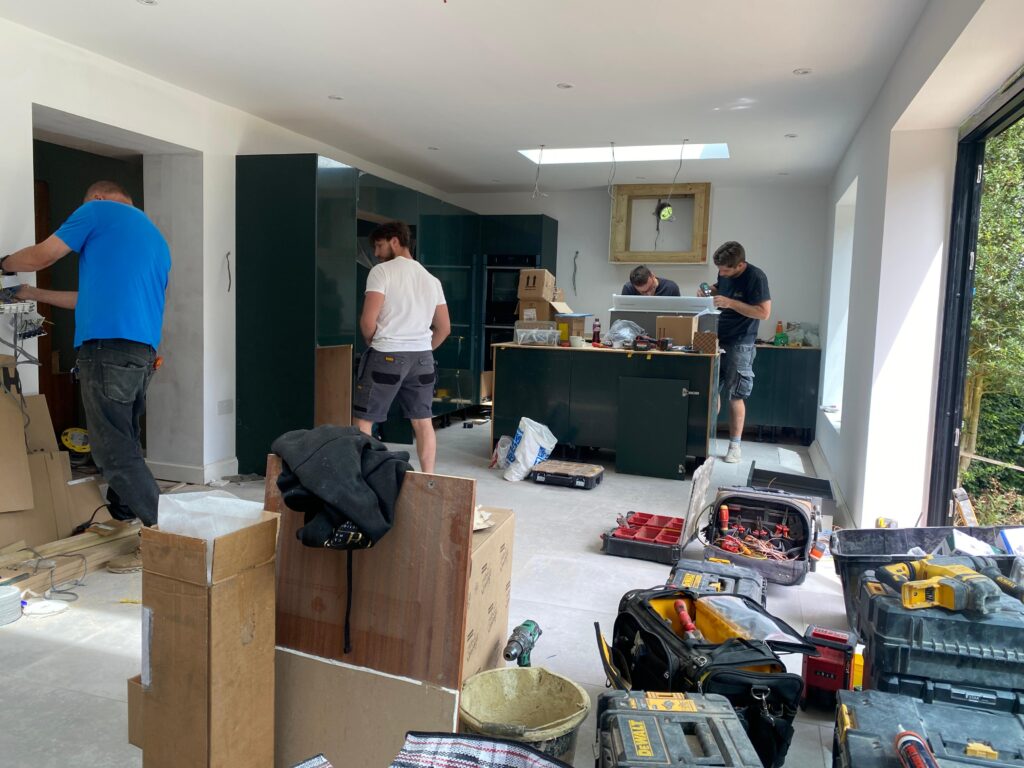Nearly every client I meet asks me to recommend a builder. It’s no surprise—finding a reliable, skilled builder is one of the most crucial parts of a successful project. And while everyone agrees the best way to find a good builder is through personal recommendation, not everyone who’s had building work done feels confident enough to recommend their builder. That said, personal referrals remain the best place to start.
In my experience, truly good builders tend to have a waiting list—often anywhere from 3 to 9 months. Don’t let that put you off. A builder who’s available to start right away may either be overstretched or not busy for a reason. Similarly, if a builder doesn’t return your call immediately, it doesn’t necessarily mean they’re disorganised or uninterested. It might mean they’re giving their full attention to the project they’re currently working on—and that’s exactly the kind of focus you want when it’s your project.
Most small to medium-sized contractors take on just one or two projects at a time. They’ll often stagger their tradespeople between jobs to keep their team working continuously. This approach can work well, but it’s important to ensure that you have either a dedicated site foreman or a main contractor who understands your project holistically.
Cost and Tenders
You usually get what you pay for. When you tender your project using the same drawings and specifications to multiple builders, the quotes will vary. It’s a time-consuming process—typically taking around a month—and some builders now charge to produce a quote, refundable upon appointment. I recommend approaching at least three contractors. Ensure they’ve visited the site with you and reviewed the drawings so you can assess their quote alongside your personal impression of them and their responses to a few key questions:
Key Questions to Ask a Builder
1. Team
How many people will be on site daily? This gives you a sense of pace and how quickly the work might progress.
2. Labourer Provision
Will there be a dedicated labourer on site every day? Labourers play a vital role—they support skilled trades, keep the site tidy, maximise skip use, and, crucially, ensure your home is clean and presentable if you’re living on-site during the build.
3. Site Foreman
Who is running the job day-to-day? Will they be on site full time or dropping in once a week? Either can work—as long as there’s genuine overview and someone who understands and cares about your project as much as you do.
4. Site Visits
You want the main contractor to visit the site at least once a week and commit to regular site meetings with you. This keeps communication clear and progress accountable. Ideally, they’ll be on site early in the week—around 8am—to brief the team, set expectations, and energise the crew. A builder who shows up sporadically mid-afternoon and stays for 2 hours ‘shooting the breeze’ chatting and distracting the team does not inspire confidence or productivity. This is not a professional or constructive way to run a team.
5. Drawings
Is the contractor printing and distributing updated drawings to the site team as the project evolves? If your team doesn’t know about key changes or design decisions, the main contractor isn’t doing their job properly.
6. Hours
Standard contractor hours are 8am–4pm. But check that those are real working hours. If the team shows up at 8, but then chats over coffee and cigarettes until 8:45, and leaves early to avoid traffic or for childcare at 3.15pm, you’re not getting full value. That kind of time loss – 1.5 hours a day – adds up to an entire working day each week, per person.
Handling Mistakes and Setbacks
This is something you won’t truly know until things go wrong—but it’s critical. Ask anyone recommending a builder how they handled issues during the project. Were they honest, resourceful, and respectful? Did they own their mistakes and provide solutions? Or did they get defensive and try to move on quickly?
The tradespeople on site should not be using your personal equipment. Items such as wheelbarrows, spades, garden hoses, brooms, vacuum cleaners, or any other tools should not be borrowed or used without permission. It’s particularly frustrating to go and mow the lawn on a Sunday afternoon, only to discover that all your petrol has been used because someone couldn’t be bothered to get their own. Please ensure your belongings are respected.
No building project runs perfectly. What matters is whether your builder has a growth mindset. Do they reflect, improve, and care about how the experience felt for the client? Personally, I always hold a “lessons learned” meeting post-completion—to understand what worked, what didn’t, and what we can take forward.
Finding the right builder takes time and care—but asking the right questions and being thorough in your selection process makes all the difference in how your project will unfold. And don’t forget: it’s not just about what your builder can do—it’s about how they do it.

